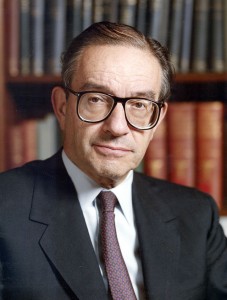Former Federal Reserve Chairman Alan Greenspan believes some elements of the stock market, particularly those in equities, will see a “significant correction” and eventually experience a decline after soaring to record highs over the past couple of years.
The 88-year-old Greenspan told Bloomberg Television on Wednesday that the market has recovered exceptionally well since the financial crisis a few years ago that it has to inevitably correct itself. He conceded, however, that he does not know when that incident would take place.
 Although some financial commentators hypothesize that the Fed’s record-low, artificial interest rates are generating asset bubbles all over the marketplace, Greenspan disagreed and doesn’t think for one moment that asset prices are overvalued or “grossly overpriced.” The author of “The Map and The Territory” added that when he judges the value of a stock he measures its rate of return over sovereign debt yields.
Although some financial commentators hypothesize that the Fed’s record-low, artificial interest rates are generating asset bubbles all over the marketplace, Greenspan disagreed and doesn’t think for one moment that asset prices are overvalued or “grossly overpriced.” The author of “The Map and The Territory” added that when he judges the value of a stock he measures its rate of return over sovereign debt yields.
“I would say that’s closer to normal after being exceptionally high, and that means we are not yet in a stressful position,” said Greenspan, who was at the head of the United States central bank for nearly 20 years before stepping down in 2006 and being succeeded by Ben Bernanke.
Last week, Greenspan spoke in an interview with the Wall Street Journal’s MarketWatch and presented the case that the Fed cannot prevent market bubbles and that at times bubbles are the result of human nature, noting that there are limits as to what monetary policy can actually do.
“When bubbles emerge, they take on a life of their own. It is very difficult to stop them, short of a debilitating crunch in the marketplace,” Greenspan stated. “I do believe that central banks that believe they can quell bubbles are living in a state of unrealism.”
Greenspan added that one of the real problems in the U.S. today is a paucity of savings and capital investment, which has led many Austrian economists to scoff at this notion because the Fed’s low interest rates have both deterred people from saving and they have distorted the market, which send the wrong signal and diminish capital investment.
Amid the rising tide of social media and biotech stocks, Fed Chair Janet Yellen conceded that these are facing bubbles that are on the verge of bursting. She urged investors to be cautious when putting money into these dangerous and volatile stocks. Although she admitted that there are bubbles right now, Yellen also confirmed that she wouldn’t decrease its massive easing program to quench the forming bubbles, citing the shaky labor market and real estate industry.
More than a century ago, economist Ludwig von Mises wrote in “Theory of Money and Credit” that banks expand their credit that can’t be me by their own reserves and that of their clients, but it is maintained and encouraged by central banks through the means of low interest rates. This heightened credit then leads to borrowed funds flowing through the economy that ultimately incites malinvestments and bubbles – thus described as the boom-bust cycles.



